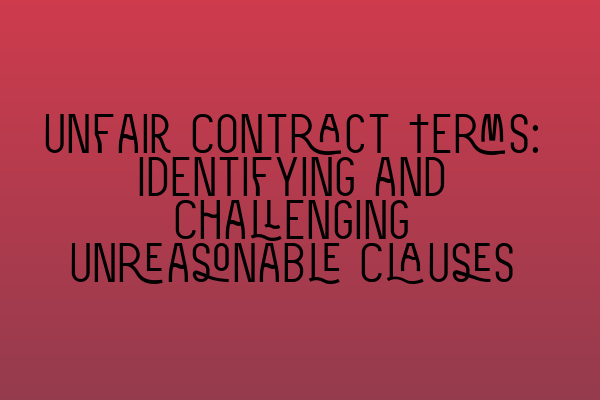Unfair Contract Terms: Identifying and Challenging Unreasonable Clauses
As a solicitor specializing in contract law, it is crucial to understand the importance of ensuring fair and reasonable terms in contracts. Unfair contract terms can have significant implications for both individuals and businesses, leading to imbalances in the bargaining power between parties, unfair distribution of risk, and even potential legal disputes.
In this blog post, we will explore the concept of unfair contract terms, how to identify them, and the steps to challenge and negotiate these unreasonable clauses. It is vital to equip yourself with this knowledge to protect your clients’ interests and ensure they enter into agreements that are fair and just.
Identifying Unfair Contract Terms
Before we delve into the process of challenging and negotiating unfair contract terms, it is essential to understand what constitutes an unfair term. The Unfair Contract Terms Act 1977 (UCTA) provides the framework for identifying and addressing such clauses in contracts.
According to UCTA, a contract term may be considered unfair if it significantly favors one party, causing a significant imbalance in the rights and obligations of the parties involved. This can include:
1. Excessive Limitation of Liability: When a party seeks to limit or exclude their liability for a breach of contract unreasonably.
2. Unfair Exclusion Clauses: Provisions that seek to exclude or restrict liability for negligent acts or breach of statutory duties.
3. Unreasonable Liquidated Damages: Clauses that impose an unreasonable pre-estimate of damages in the event of a breach.
4. Unfair Time Limitation: Imposing unreasonably short time limits for making claims or initiating legal action.
5. Unequal Bargaining Power: Terms that take advantage of a party’s weaker negotiating position, often found in contracts of adhesion or standard form contracts.
It is crucial to thoroughly analyze and identify any potentially unfair contract terms when reviewing agreements on behalf of your clients.
Challenging Unreasonable Clauses
Once you have identified an unfair contract term, it is essential to take the necessary steps to challenge and negotiate the clause to ensure a fair outcome. Here are some strategies to help you in this process:
1. Assessing Reasonableness: Evaluate the reasonableness of the unfair term by considering the UCTA reasonableness test. This involves assessing the nature of the term, the circumstances surrounding the contract, and the respective bargaining power of the parties.
2. Negotiating Amendments: Communicate with the opposing party or their legal representatives to negotiate amendments to the unfair contract term. Clearly explain the reasons for considering the term unfair and propose alternative language or arrangements that would be fairer and more equitable for all parties involved.
3. Mediation or Alternative Dispute Resolution (ADR): In cases where negotiations fail, consider engaging in mediation or other forms of ADR to resolve the dispute. This can be a cost-effective and efficient means of resolving disagreements without resorting to litigation.
4. Court Action: If all other attempts to challenge the unfair contract term prove unsuccessful, initiating court proceedings may be necessary. Seek the advice of an experienced litigation solicitor who can guide you through the process and represent your client’s interests effectively.
Staying Informed and Prepared
As a solicitor, it is crucial to stay informed about recent developments in contract law and changes in legislation that may impact the interpretation and enforcement of unfair contract terms. Regularly updating your knowledge through professional development courses and reading reputable legal publications will enhance your skills in identifying, challenging, and negotiating unfair clauses effectively.
Remember, protecting your clients’ interests and ensuring fair contract terms is an ongoing process. By staying attentive to changes in the legal landscape, you can skillfully navigate the complexities of contract law and secure favorable outcomes for your clients.
In Conclusion
Understanding the concept of unfair contract terms, identifying them, and challenging unreasonable clauses is fundamental for solicitors practicing contract law. By familiarizing yourself with the provisions of UCTA and adopting proactive strategies to address unfair terms, you can safeguard your clients’ interests and promote fairness and equity in contractual relationships.
If you’re interested in becoming a solicitor, check out our related article on “Securing Training Contracts: A Roadmap to Becoming a Solicitor.” Additionally, our articles on “Mentorship for Aspiring Solicitors: Nurturing Talent in the Legal Field,” “Legal Challenges and Pitfalls: Navigating the Complexities of the Legal System,” “The GDL (Graduate Diploma in Law): A Pathway to Becoming a Solicitor,” and “Mastering the Solicitor’s Path: Prepare for the Journey Ahead” will provide valuable insights for your legal career.
At SQE Contract Law, we are dedicated to providing comprehensive legal resources for aspiring and practicing solicitors. Stay tuned for more informative articles on various legal topics to enhance your professional knowledge and expertise.
